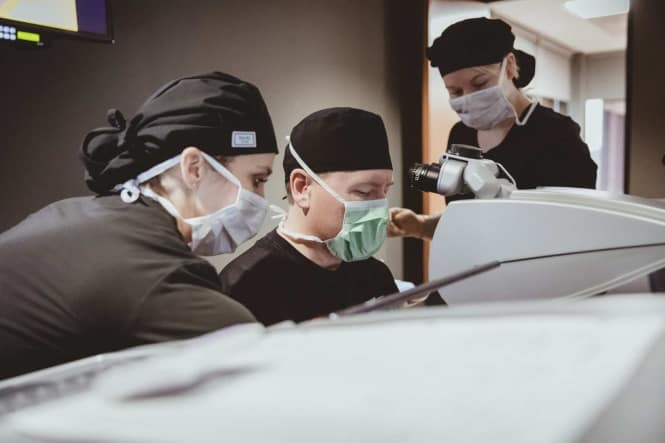Learn About the 6 Types of Laser Eye Surgery
What is the first procedure that comes to mind when you think of laser eye surgery? If you said LASIK, you’re definitely not the only one. However, despite popular belief, LASIK is not the only vision correction option available.
In fact, there are five other types of laser eye surgery that many people don’t know about.
Durrie Vision is the only facility in the region that offers all six laser eye procedures, meaning even if one procedure isn’t right for you, we offer several alternatives to help you reach your vision goals. Keep reading to learn more about the types of laser eye surgery and which one may be best for you.
What You Should Know About Laser Eye Surgery Price in Kansas City →
1. SBK Advanced LASIK
SBK Advanced LASIK is the most advanced form of laser vision correction surgery. It treats common vision conditions such as farsightedness, nearsightedness, and astigmatism.
During the LASIK procedure, your doctor first creates a micro-thin circular flap in your cornea (thin, outer skin of the eye) using a femtosecond laser. Then, a computer-guided excimer laser removes the corneal tissue to reshape the cornea, correcting the refractive error.
While this is the most popular type of laser eye surgery in Kansas City, not every patient we see is necessarily going to be a candidate for it. That’s when we can start exploring other options.
How to Find LASIK Financing in Kansas City →
2. Refractive Lens Exchange
Refractive Lens Exchange (RLE) is a popular eye surgery for people who are experiencing the effects of presbyopia, a common age-related condition that leads to the progressive loss of near vision before ultimately developing into a cataract. During an RLE procedure, your surgeon replaces your dysfunctional natural lens with a premium intraocular lens designed to provide focusing power at near, intermediate, and far distances. RLE not only reduces or eliminates the need for glasses, bifocals, and/or readers, it also prevents cataracts from developing in the future.
3. Refractive Cataract Surgery
If a cataract has developed, vision will continue to deteriorate as the lens becomes hard, yellow, and cloudy. To restore vision, the lens must be removed and replaced with an artificial lens implant. Recent advancements in lens technologies make it possible to not only eliminate a cataract, but also a patient’s dependency on glasses and bifocals. During Refractive Cataract Surgery, the clouded lens is replaced with an intraocular lens designed to also correct common vision conditions such as nearsightedness, farsightedness, astigmatism, and presbyopia.
4. Advanced Surface Ablation (ASA)
Also known as PRK, Advanced Surface Ablation corrects vision by reshaping the cornea. Therefore it’s similar to SBK Advanced LASIK, but the key difference is your surgeon will not create a corneal flap. Instead, your surgeon removes the outer skin of your cornea then applies the laser directly to the cornea. As a result, this type of laser eye surgery can be a great LASIK alternative if you have limited corneal thickness, scarring from contacts, previous eye surgeries, or specific occupational or recreational needs.
5. SMILE Vision Correction
SMILE (Small Incision Lenticule Extraction) is a minimally invasive procedure designed to correct nearsightedness and astigmatism. Using the femtosecond laser, a thin contact-like layer and small opening are created inside the cornea. The surgeon then removes the lenticule, which changes the shape of the cornea, thereby achieving the desired refractive correction.
6. EVO ICLs
EVO ICL is an implantable collamer lens (ICL) designed for people who aren’t candidates for LASIK due to extreme nearsightedness. During the EVO ICL procedure, microscopic lenses are placed behind the iris and in front of the natural lens. In this position, the implanted lens functions to focus light properly onto the retina helping create clear distance vision and reduce or eliminate your dependency on thick glasses or contacts.
Learn more about which type of laser eye surgery you need at Durrie Vision
Now that you know the types of laser eye surgery, it’s time to discover which surgery is right for you. At Durrie Vision, our Advanced Ocular Analysis is a series of the most advanced eye tests available, allowing us to recommend a procedure for your unique vision needs.
Schedule your consultation or use our self-candidacy test to get started.

